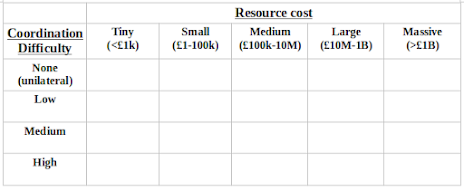Bottom Up Solutions: What Options Do We Have?

The race for the next Prime Minister is getting started. But judging by the focus of the candidates (culture war and tax cuts), none of them are serious about the crises gripping this country. It looks like whoever wins, we lose. This country will continue to go downhill, with the next PM promising to get into the driving seat and put his or her foot on the accelerator. If we're to thrive through this, we need to rediscover the pre-war English model of not relying on central government to get anything done. Unfortunately, local government is a mess, and doing anything on a large scale invites the meddling of both them and Westminster. Anything requiring a competent government just isn't going to happen. Realistically, we need to be focused on the upper left of this grid -- solutions that require relatively small amounts of resources and which can be done without buy in from The Powers That Be (co-ordination difficult as I use it here comprises both the number of stakeholders yo...